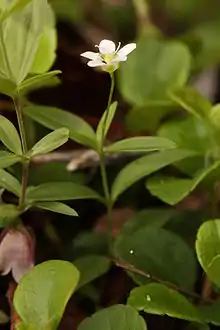Moehringia lateriflora
Moehringia lateriflora, commonly known as the bluntleaf sandwort,[3] is a plant species native to Europe, Asia, the northern United States and most of Canada. It has been reported from every province and territory in Canada except the Northwest Territories, as well as every state in the northern half of the US, including Alaska, plus New Mexico and from Saint Pierre & Miquelon. It is also reported from Russia, China, Korea, Mongolia, Japan, Kazakhstan, Finland, Sweden, Norway, Latvia, Estonia, Belarus, Ukraine.[2][4][5]
| Moehringia lateriflora | |
|---|---|
 | |
| Scientific classification | |
| Kingdom: | Plantae |
| Clade: | Tracheophytes |
| Clade: | Angiosperms |
| Clade: | Eudicots |
| Order: | Caryophyllales |
| Family: | Caryophyllaceae |
| Genus: | Moehringia |
| Species: | M. lateriflora |
| Binomial name | |
| Moehringia lateriflora (L.) Fenzl | |
| Synonyms[1][2] | |
| |
Moehringia lateriflora is a perennial herb spreading by means of underground rhizomes, often forming large colonies. Aerial stems are up to 30 cm long, covered with retrorse (pointing down toward the base of the stem) hairs. Leaves are broad, up to 35 mm long. Flowers occur singly or in groups of 2–5. Petals are white, up to 6 mm long, generally twice as long as the sepals. [2][6][7]
References
- The Plant List
- Flora of North America v 5
- "Plants Profile for Moehringia lateriflora (bluntleaf sandwort)". Natural Resources Conservation Service. United States Department of Agriculture. Retrieved 13 April 2015.
- Flora of China
- Den virtuella Floran, Ryssnarv, Naturiska Rikismuseet, Museum of Natural History, Stockholm
- photo of specimen at Missouri Botanical Garden
- Fenzl, Eduard. 1833. Versuch einer Darstellung der Geographischen Verbreitungs- and Vertheilungs-Verhältnisse der Natürlichen Familie der Alsineen 18, 38.